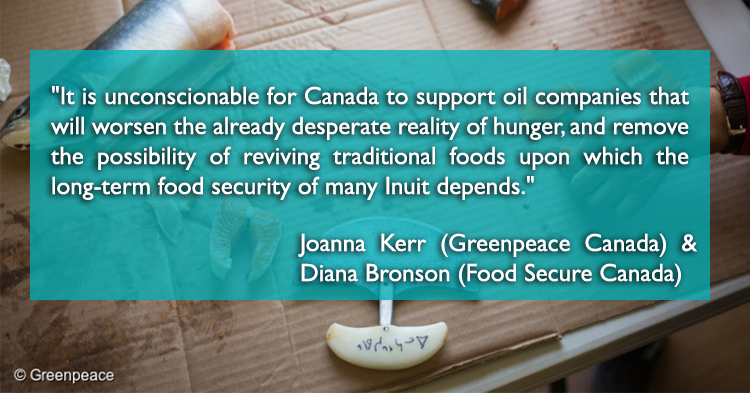Energy Project Threatens Food Security in Canada’s North (Opinion: National Observer)

![]() Context: The Supreme Court started hearing the case brought by the small Inuit community of Clyde River to block seismic testing (oil exploration) that threatens marine life in their local waters, on November 30 2016. Inuit communities are already experiencing food crisis. Seismic testing could have a devastating and lasting impact on the marine ecosystems of Baffin Bay, which traditional fishermen and hunters depend upon to feed their families. This is a landmark case that could define how Canada regulates industrial activity on indigenous lands.
Context: The Supreme Court started hearing the case brought by the small Inuit community of Clyde River to block seismic testing (oil exploration) that threatens marine life in their local waters, on November 30 2016. Inuit communities are already experiencing food crisis. Seismic testing could have a devastating and lasting impact on the marine ecosystems of Baffin Bay, which traditional fishermen and hunters depend upon to feed their families. This is a landmark case that could define how Canada regulates industrial activity on indigenous lands.
Opinion of Joanna Kerr & Diana Bronson, published by the National Observer on November 24th 2016
"Food insecurity in Nunavut is linked to exorbitant food prices at the grocery store. In Clyde River, Nunavut, a box of Cheerios goes for $13 and a bundle of asparagus is almost $24. Across the territory, people pay, on average, twice as much as the rest of Canada for staple items. Canada’s subsidy program for northern food, Nutrition North, is clearly in need of a complete overhaul, which even Minister of Indigenous Affairs and Northern Development, Carolyn Bennett, has acknowledged."
Fortunately, Inuit communities have a ready alternative to expensive grocery stores: food from the land and waters that surround them, which can include wild edible plants, birds, fish, as well as land and marine mammals. These country foods provide a highly nutritious and lower cost alternative and supplement to unaffordable groceries imported from thousands of kilometres away and serve as a buffer during hard economic times. They are absolutely critical to food security in the north.
But, for Baffin Island Inuit in the eastern Canadian Arctic, this essential resource is threatened by the oil industry and its backers within the Canadian government.
In 2014, the National Energy Board (NEB) granted a permit to a consortium of oil exploration companies to carry out seismic blasting in Baffin Bay and Davis Strait, despite widespread opposition from local Inuit concerned about the potential impact on marine life and food sovereignty.
Seismic blasting is a form of oil exploration in which ships tow air guns that fire extremely loud sound blasts underwater. The sound penetrates the sea floor and returns information on the geological conditions beneath, including the location of possible oil and gas deposits. The sounds are so loud, and carry so far underwater, that even at great distances they can cause serious harm to the marine life Inuit depend on. To whales, sound is everything and seismic blasts would seriously disrupt their ability to communicate, travel, find food and reproduce. Up close, the sounds can physically damage and even kill ocean dwellers.
The project could have devastating impacts on the Arctic ecosystem and the subsistence economy that keeps many Inuit families afloat in hard times. The implications hit close to home for Nunavut households, where they often rely on what hunters can bring home to feed their families.
Protecting country food is about more than getting enough to eat, though. Inuit food systems have been debilitated by centuries of colonial policy. During the 1950s -1970s, Inuit were forcibly relocated into sedentary towns managed by the government—where educational, religious, penal, and even medical institutions shamed and discouraged Inuit ways of life. Today, many Inuit take traditional food systems and food sovereignty as an important part of self-empowerment and healing the wounds left by colonization.
In the Clyde River case, the struggle to protect a food source is also a struggle to protect a way of life and a cultural identity.
Left with few options, the small Inuit community of Clyde River is now engaged in a David-and-Goliath battle against seismic companies, the National Energy Board, and the Canadian government to get this project stopped. Next Wednesday, November 30th, they are heading to the Supreme Court in a historic case that places food security at the centre of a fight to protect culture, wildlife, and the right of Indigenous Peoples to withhold consent for projects that seriously impact them."
 |
Opinion: Energy project threatens food security in Canada’s NorthFor Baffin Island Inuit in the eastern Canadian Arctic, essential resources are threatened by the oil industry and its backers within the Canadian government. Read the full National Observer article. |
- Identifiez-vous pour poster des commentaires
